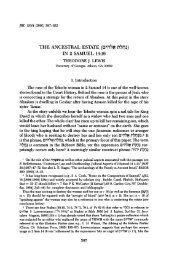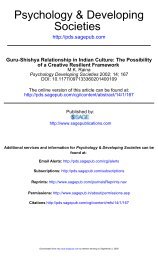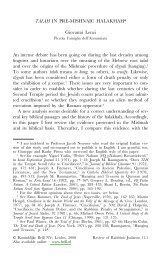Religion, Theology, and Philosophy on the Way to Being and Time ...
Religion, Theology, and Philosophy on the Way to Being and Time ...
Religion, Theology, and Philosophy on the Way to Being and Time ...
You also want an ePaper? Increase the reach of your titles
YUMPU automatically turns print PDFs into web optimized ePapers that Google loves.
I. M. Fehér / Research in Phenomenology 39 (2009) 99–131 127<br />
example, by Adolf v<strong>on</strong> Harnack <str<strong>on</strong>g>and</str<strong>on</strong>g> maintained decisively by Franz Overbeck.<br />
88 What is needed is a <strong>the</strong>ology liberated from <strong>the</strong> c<strong>on</strong>ceptual schemes of<br />
Greek philosophy. 89 Th erefore, Heidegger urges in his course <strong>on</strong> <strong>the</strong> Phenomenology<br />
of <str<strong>on</strong>g>Religi<strong>on</strong></str<strong>on</strong>g> “<strong>to</strong> sharply distinguish <strong>the</strong> problem of <strong>the</strong>ology from that<br />
of religi<strong>on</strong>.” 90 What it comes down <strong>to</strong> is—much al<strong>on</strong>g <strong>the</strong> lines of Dil<strong>the</strong>y’s<br />
linking of Erleben <str<strong>on</strong>g>and</str<strong>on</strong>g> Ausdruck—<strong>to</strong> fi nd a proper logos, a c<strong>on</strong>ceptuality adequate<br />
<strong>to</strong> <str<strong>on</strong>g>and</str<strong>on</strong>g> c<strong>on</strong>forming <strong>to</strong> <strong>the</strong> “object,” that is, genuine religious experience<br />
<str<strong>on</strong>g>and</str<strong>on</strong>g> faith as a living enactment.<br />
We fi nd an important follow-up observati<strong>on</strong> in <strong>Being</strong> <str<strong>on</strong>g>and</str<strong>on</strong>g> <strong>Time</strong>. Th eology,<br />
Heidegger claims, “is slowly beginning <strong>to</strong> underst<str<strong>on</strong>g>and</str<strong>on</strong>g> <strong>on</strong>ce more Lu<strong>the</strong>r’s<br />
insight, that <strong>the</strong> ‘foundati<strong>on</strong>’ <strong>on</strong> which its system of dogma rests has not arisen<br />
from an inquiry in which faith is primary, <str<strong>on</strong>g>and</str<strong>on</strong>g> that c<strong>on</strong>ceptually this ‘foundati<strong>on</strong>’<br />
not <strong>on</strong>ly is inadequate for <strong>the</strong> problematic of <strong>the</strong>ology, but c<strong>on</strong>ceals <str<strong>on</strong>g>and</str<strong>on</strong>g><br />
dis<strong>to</strong>rts it” (SZ 10/ BT 30; see GA 20: 6/4.) In his lecture “Phenomenology<br />
<str<strong>on</strong>g>and</str<strong>on</strong>g> Th eology,” held in <strong>the</strong> same year of <strong>the</strong> publicati<strong>on</strong> of <strong>Being</strong> <str<strong>on</strong>g>and</str<strong>on</strong>g><br />
<strong>Time</strong>, Heidegger interprets <strong>the</strong>ology, much in <strong>the</strong> same vein, as <strong>the</strong> “science<br />
88) See Adolf v<strong>on</strong> Harnack, Lehrbuch der Dogmengeschichte, 3 vols., 4th ed. (1909/10; Reprogh.<br />
Nachdruck. Darmstadt: Wissenschaftliche Buchgesellschaft, 1983), vol 1, 20: “Das Dogma ist<br />
in seiner C<strong>on</strong>cepti<strong>on</strong> und in seinem Ausbau ein Werk des griechischen Geistes auf dem Boden<br />
des Evangeliums.” Heidegger refers <strong>to</strong> Harnack in GA 60: 72, claiming it is precisely <strong>the</strong> seemingly<br />
sec<strong>on</strong>dary problem of “expressi<strong>on</strong>,” of “religious explicati<strong>on</strong>” <strong>to</strong> be of decisive importance,<br />
for <strong>the</strong> “explicati<strong>on</strong>” goes h<str<strong>on</strong>g>and</str<strong>on</strong>g> in h<str<strong>on</strong>g>and</str<strong>on</strong>g> with <strong>the</strong> religious experience. Th is is much in line with<br />
Gadamer’s interpretati<strong>on</strong> that <strong>the</strong>ology has, for Heidegger, primarily <strong>to</strong> do with fi nding <strong>the</strong><br />
adequate “word,” i.e., c<strong>on</strong>ceptuality, <strong>to</strong> express faith. Heidegger’s own subsequent formulati<strong>on</strong> of<br />
what dogma is shows Harnack’s obvious infl uence. See GA 60: 112: “Das Dogma als abgelöster<br />
Lehrgehalt in objektiv-erkenntnismäßiger Abhebung kann niemals leitend für die christliche<br />
Religiosität gewesen sein, s<strong>on</strong>dern umgekehrt, die Genesis des Dogmas ist nur verständlich aus<br />
dem Vollzug der christlichen Lebenserfahrung.” See also Dil<strong>the</strong>y, Einleitung in die Geisteswissenschaften,<br />
258 (“So war die Entwicklung dieses Gehaltes im Dogma zugleich seine Veräußerlichung”),<br />
274 (“hat sich die Entwicklung der Formeln, welche die religiöse Erfahrung in einer<br />
Verknüpfung v<strong>on</strong> Vorstellungen abgrenzen und gegen <str<strong>on</strong>g>and</str<strong>on</strong>g>ere Formeln innerhalb derselben <str<strong>on</strong>g>Religi<strong>on</strong></str<strong>on</strong>g><br />
wie gegen <str<strong>on</strong>g>and</str<strong>on</strong>g>ere <str<strong>on</strong>g>Religi<strong>on</strong></str<strong>on</strong>g>en rechtfertigen sollten, nicht folgerecht aus der im Christentum<br />
gegebenen Selbstgewißheit innerer Erfahrung vollzogen”). Th e <strong>the</strong>sis of <strong>the</strong> unhappy c<strong>on</strong>necti<strong>on</strong><br />
of Christianity with Greek philosophy was far from being unknown <strong>to</strong> <strong>the</strong> previous generati<strong>on</strong><br />
of liberal <strong>the</strong>ology, e.g., <strong>to</strong> Ritschl; <strong>on</strong> this point, see Wolfhart Pannenberg, Problemgeschichte der<br />
neueren evangelischen Th eologie in Deutschl<str<strong>on</strong>g>and</str<strong>on</strong>g>. V<strong>on</strong> Schleiermacher bis zu Barth und Tillich (Göttingen:<br />
V<str<strong>on</strong>g>and</str<strong>on</strong>g>enhoeck & Ruprecht, 1997), 123. As <strong>to</strong> Overbeck, Heidegger refers <strong>to</strong> him in <strong>the</strong><br />
Preface <strong>to</strong> his Phenomenology <str<strong>on</strong>g>and</str<strong>on</strong>g> Th eology.<br />
89) See GA 59: 91.<br />
90) GA 60: 310: “Scharf zu trennen: das Problem der Th eologie und das der Religiosität.” And<br />
he adds signifi cantly:“Die Th eologie hat bis jetzt keine originäre <strong>the</strong>oretische Grundhaltung der<br />
Ursprünglichkeit des Gegenst<str<strong>on</strong>g>and</str<strong>on</strong>g>es entsprechend gefunden.”







